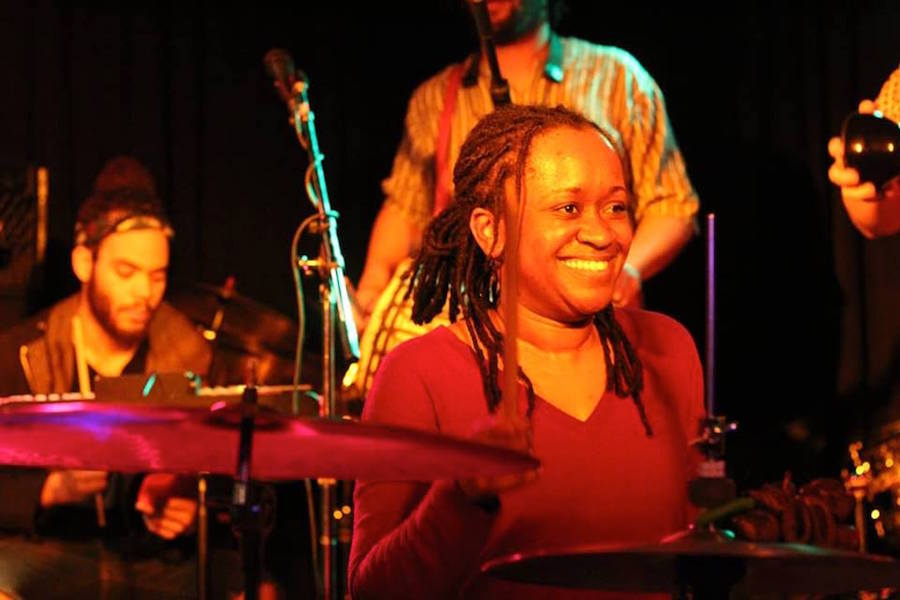
An Historic was shredding, accordion style. In the front of the room, Brian Slattery produced a scream from his fiddle, bending at the waist as An Historic threw his shoulders and head into the music. Behind them, Chris Cretella lowered his face so close to his guitar that it looked as though he might pull at the strings with his teeth. The band was not even two minutes in, and everyone was sweating.
You hand your head and sing your wounded sooooonnng, he sang ferociously, his voice full-lunged and weaving like a bell through the wailing instruments.
Friday night, An Historic—the moniker for musician Adam Matlock, backed by Dr. Caterwaul’s Cadre of Clairvoyant Claptraps— brought a whimsical, sometimes metal, kind and brooding fury to Cafe Nine. The occasion was a triple bill with artist Sam Moth and Middletown-based group The Lost Tribe, to celebrate the release of An Historic’s new EP Something We Could Never Live Without. Close to 50 came out for the show, which lasted into the wee hours of the morning.
There’s something about Matlock that calls for an unconventional show, where the surprises keep coming, all of them welcome. For years, he’s been testing the limits of what he and his accordion can do, and how much of it his listeners will follow. Recent years have brought on-demand political music, an experimental accordion album, some cheeky EP titles, and whip-smart lyrics, that use big words judiciously and right on time. His music is utterly his own (except when he is playing covers, and making them his own), and that’s sort of the point.
If there is a bill to reflect that, it was this one, with community members shifting in and out of soft focus for the entire evening. Taking the stage around 10:30, Sam Moth warmed up with a cover, then stood poised and quiet at the mic for a moment, a tiny thread pulling up from her feet to her head. Her arms hung by her sides. Moving her hand just slightly, she pressed a button, setting an etherial, wonderfully layered set into motion.
Possessed now, she sang. Possessed now. Previously unmoored. Her hands shifted, traveling upwards. They clasped at her waist, then sternum as she too scaled the upper limits of her voice, climbing her octave as the audience watched, spellbound. Her voice became two, split by a loop. Moth held a high note, hands fluttering to the mic as she opened her mouth wider. Honey and silk flew out, stopping for a moment on the tiny singing bowl at her side.
Someone shushed the lone guy still talking in the back. The audience wanted to miss nothing: each piece an earworm, with a guessing game of notes embedded in it. Using the singing bowl in her sets, Moth spun a sort of vocal tapestry, bright threads zigzagging wildly as she jumped from operatic to pastoral, chant-like to citywide musings.
As Moth closed to wild applause from the audience, The Lost Tribe took the stage, finishing setup that they hadn’t gotten to earlier in the evening. The band is six-piece group with flute, sax, guitar, trombone, drums and balafon, bringing the tradition of West African music to Southern Connecticut. No sooner had Jocelyn Pleasant introduced the group than it launched into a propulsive, enveloping rhythm, Pleasant leading the charge, then pulling back for others to follow.
Pleasant looked over at Seny Camara, locking eyes as his palms flew from djembe to the air above it, and back down to its taut surface again. His whole body moved with the percussion, arms hammering down, shoulders heaving, eyes ablaze. He didn’t look at the drums because his hands knew everything they needed to already. Instead, he watched the crowd, glancing back at Pleasant every 30 seconds for a cue.
They were on fire, dripping with sweat beneath a green- and pink-lit stage. As they began another piece, guitarist Matt Belliveau pulled the group into a reggae-flecked, loping rhythm, bringing the other players in slowly, until a fleshy ensemble piece suddenly appeared. In the back, Rich McGhee came in on alto sax, the instrument’s gentle, warm wailing like birdsong.

It was a sort of prolonged welcome for An Histotoric, who came to the stage with a mix of new and old pieces. Kicking the set off with a piece he recorded for a NPR Tiny Desk Concert with Dr. Caterwaul’s, Matlock got right to the core of his performances: his accordion doesn’t do what you expect it to. And that’s okay. Like, very okay.
For the remainder of the evening, he glowed from the near-center of the stage, posed beneath bright light with his accordion before him, like a natural extension of his hands. Around him, music rose up to meet his instrumentals, clashing then meshing with each song.
That’s true on the recording too. Something We Could Never Live Without, like its progenitor, contains multitudes. Drawing on An Historic’s smart and witty lyrics, there’s a distinct element of storytelling, with long and winding narratives that you want to fall into and stay for a while. They aren’t always easy: sometimes Matlock appears to be in great pain or distress, and a catch in his throat or jump up an octave is all you need to signal it.
But even then, it’s an exploration into the depth of the human voice, and perhaps the human psyche. Story crumbled, they contradict you, he sings over and over again on on “Therapy,” where the final minute and 11 seconds use sharp, staccato sounds to make it sound like there is a fire going in the background.
Or “Curled Fingers,” which has a droning, circling chorus of La daaa da daaa with voices that rise above it. Matlock’s voice is a powerful, beautiful thing, so muscled it seems impossible to bring down, then so meek and humble it might be felled in one try.
If each song is a room, then Something We Could Never Live Without has built a house, a hideaway where you are safe to mourn and to brood, to be courageous and unsure. Rooms are dark and womb-like, but some are also full of light, or let it pulse and beat through the windows at different times of the day. There’s a welcome mat somewhere there, but not a map. Well before the end of the EP, you can imagine Matlock inside, waiting, to say hello to anyone who crosses the threshold.